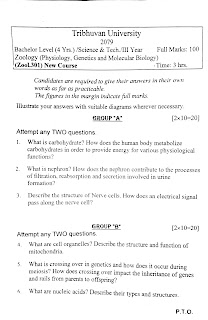BSC THIRD YEAR ZOOLOGY 2080 TU Exam Paper
Tribhuvan University
2079
Bachelor Level (4 Yrs.)/Science & Tech./III Year
Full Marks:100
Zoology (Physiology,Genetics and Molecular Biology)
(Zool.301) New Course Time: 3 hrs.
Candidates are required to give their answers in their own words as far as practicable.
The figures in the margin indicate full marks.
Illustrate your answers with suitable diagrams wherever necessary.
GROUP"A"
[2x10=20]
Attempt any TWO questions.
1. What is carbohydrate? How does the human body metabolize carbohydrates in order to provide energy for various physiological functions?
2. What is nephron? How does the nephron contribute to the processes of filtration, reabsorption and secretion involved in urine formation?
3. Describe the structure of Nerve cells. How does an electrical signal pass along the nerve cell?
GROUP "B"
Attempt any TWO questions.
[2x10=20]
4. What are cell organelles? Describe the structure and function of mitochondria.
5. What is crossing over in genetics and how does it occur during meiosis? How does crossing over impact the inheritance of genes and rails from parents to offspring?
6. What are nucleic acids? Describe their types and structures.
P.T.O.
GROUP "C"
[8x5=40]
Attempt any EIGHT questions.
Describe the structure and function of an enzyme.
8. Describe the regulation of respiration.
9.Describe cardiac cycle.
10. What are the pituitary glands? Describe the functions of hormones secreted by pituitary gland
11. Discuss the process of spermatogenesis in human.
12..Describe structure and function of microtubules and unicrofilaments.
13. What is meant by multiple allele? Describe the inheritance of ABO system.
14. Explain the relationship between DNA, RNA and proteins in cells.
15. What is Gene Therapy? What are the potential benefits and ethical considerations associated with the application of Gene Therapy?
16. Describe the process of gene regulation and control in Eukaryotes.
GROUP "D"
[8x2.5=20]
17. Give very short answers of the following (any eight)
i. Cofactors
ii. Homeostasis
iii. Electrolyte balance
iv. Neuronal integration
v. Mechanism of hearing
vi. Chromatin fibres
vii. Sex linkage
viii.DNA finger printing
ix. Ribosomal RNA
x. Wobble hypothesis
Tribhuvan University
Year: 2079
Bachelor Level (4 Yrs.)/Science & Tech./III Year
Full Marks: 100
Zoology (Physiology, Genetics, and Molecular Biology)
Course Code: Zool.301
New Course
Time: 3 hrs.
Instructions:
- Candidates are required to give their answers in their own words as far as practicable.
- The figures in the margin indicate full marks.
- Illustrate your answers with suitable diagrams wherever necessary.
GROUP "A"
[2x10=20]
Attempt any TWO questions.
- What is carbohydrate? How does the human body metabolize carbohydrates in order to provide energy for various physiological functions?
- What is nephron? How does the nephron contribute to the processes of filtration, reabsorption, and secretion involved in urine formation?
GROUP "B"
[2x10=20]
Attempt any TWO questions.
- What are cell organelles? Describe the structure and function of mitochondria.
- What is crossing over in genetics and how does it occur during meiosis? How does crossing over impact the inheritance of genes and traits from parents to offspring?
- What are nucleic acids? Describe their types and structures.
P.T.O.
GROUP "C"
[8x5=40]
Attempt any EIGHT questions.
- Describe the structure and function of an enzyme.
- Describe the regulation of respiration.
- Describe the cardiac cycle.
- What are the pituitary glands? Describe the functions of hormones secreted by the pituitary gland.
- Discuss the process of spermatogenesis in humans.
- Describe the structure and function of microtubules and microfilaments.
- What is meant by multiple alleles? Describe the inheritance of the ABO system.
- Explain the relationship between DNA, RNA, and proteins in cells.
- What is Gene Therapy? What are the potential benefits and ethical considerations associated with the application of Gene Therapy?
- Describe the process of gene regulation and control in Eukaryotes.
GROUP "D"
[8x2.5=20]
Give very short answers to the following (any eight)
- Cofactors
- Homeostasis
- Electrolyte balance
- Neuronal integration
- Mechanism of hearing
- Chromatin fibers
- Sex linkage
- DNA fingerprinting
- Ribosomal RNA
- Wobble hypothesis



Comments
Post a Comment